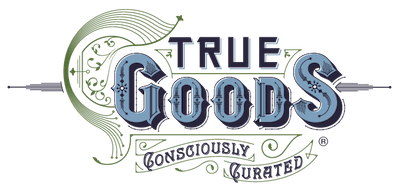‘Tis the season of giving and sharing, and resisting puppy stares and kitten meows is doubly difficult.
With so much amazing holiday food to go around it’s natural to want to include our beloved family pets in the celebration by slipping them tasters of our favorite dishes or including them in holiday decorating festivities. But be cautious - and stay strong!
While some holiday treats (like chocolate) and decorations (like tinsel) are well known as toxic and/or dangerous to pets, others such as mistletoe are less obvious and often forgotten from one year to the next. A friendly reminder of holiday pet hazards never hurts. So we at True Goods have compiled a list of holiday meal ingredients and decorations that are either worth eliminating, replacing with a safer alternative, or using with caution.
Top Decoration Dangers
Tinsel, ribbon, wrapping paper, and boxes: Both cats and dogs tend to be drawn to these shiny, new and different “chew toys” that appear during the holidays. If ingested, these decorations may get stuck in a pet’s digestive tract and require surgical removal if they’re unable to pass on their own.
Holiday lights and extension cords: These are often interpreted as toys to pets, but when chewed or played with lights and cords can lead to electric shock and possible electrocution. Always keep lights out of your pets’ reach, secured, or adequately covered to prevent chewing. Remember to check both indoor and outdoor lights and extension cords for proper safety measures.
Mistletoe, holly and poinsettias: It was once thought that poinsettias were extremely toxic to pets and mistletoe was not, but poinsettias are actually not very toxic and mistletoe is extremely toxic. Poinsettia consumption can cause mouth irritation, whereas mistletoe consumption causes vomiting, breathing difficulty, diarrhea, and even shock and death within hours of consumption. Holly can also cause illness such as vomiting, diarrhea and lethargy.
Pine needles: When consumed in large amounts pine needles can be extremely toxic to your pet. They also can become lodged in a dog’s throat if swallowed whole. So clean up pine needles on a regular basis to avoid danger.
Water containers for holiday trees and plants: Dogs and cats appreciate a novel bowl of water, but this can be dangerous during the holiday season. Sometimes preservatives, chemicals, and/or color additives are added to holiday trees and plants for longer life and additional color, and these chemicals end up in the water at the base of the tree. It’s important to remember that these chemicals are toxic to our pets – and to us for that matter! Consider creating a barrier so that pets cannot access the water for trees and plants.
Candles and fragrances: The sight and scent of candles and fragrances are alluring to pets, posing a major fire hazard if knocked over and health hazard when ingested or put in contact with your pet’s skin. Some fragrances (such as liquid potpourri) can even cause severe illness and/or death. Not jolly at all!
Maximum Supervision Ingredients
Rich, fatty foods such as turkey scraps and gravy: When eaten, these foods can cause pancreatitis (inflammation of the digestive gland, which makes it very hard for your pet to break down the fats and food pieces in order to pass them). It may taste good going down, but pancreatitis is really painful and can cause your pet to be hospitalized. Less serious symptoms may include upset stomach, vomiting and diarrhea.
Bones: When bones are chewed they tend to splinter (particularly poultry bones), which can tear and/or become lodged in your pet’s stomach or digestive tract. Keep bones OUT of pet’s reach and dispose of them properly and immediately.
Onions, grapes and raisins: Onions are used in many different holiday dishes and are extremely toxic to dogs. Onions trigger a dog’s red blood cells to break down, causing anemia. Grapes and raisins are also extremely toxic and can lead to kidney failure in pets.
Alcoholic beverages: This rule is applicable year round! Dogs are particularly drawn to the scent and taste of beer but alcohol is very toxic to pets. It is also a major byproduct of ingested yeast dough, which can continue to rise when in a pet’s stomach and cause bloating along with other serious health issues.
Chocolate: The most classic pet toxin of all! All chocolate is unhealthy for pets to consume, but baking chocolate can actually be deadly. It can damage your pet’s nervous system, urinary system and heart.
If you have any questions or concerns regarding pet safety during the holidays (or anytime) please call the Pet Poison Helpline at 1-800-213-6680, or visit them online at www.petpoisionhelpline.com.
Here’s to a safe and healthy holiday with your family, friends and pets!
This post is based on the following articles:
- "Winter Holiday Pet Poison Tips" from the Pet Poison Helpline
- “Holiday Toxins Newsletter” by By Justine Lee, DVM, DACVECC, DABT for the Pet Poison Hotline
- “Holiday Issues” by the American Humane Association in 2013
- “Holiday Health Hazards” by Washington State University College of Veterinary Medicine, December 2011

